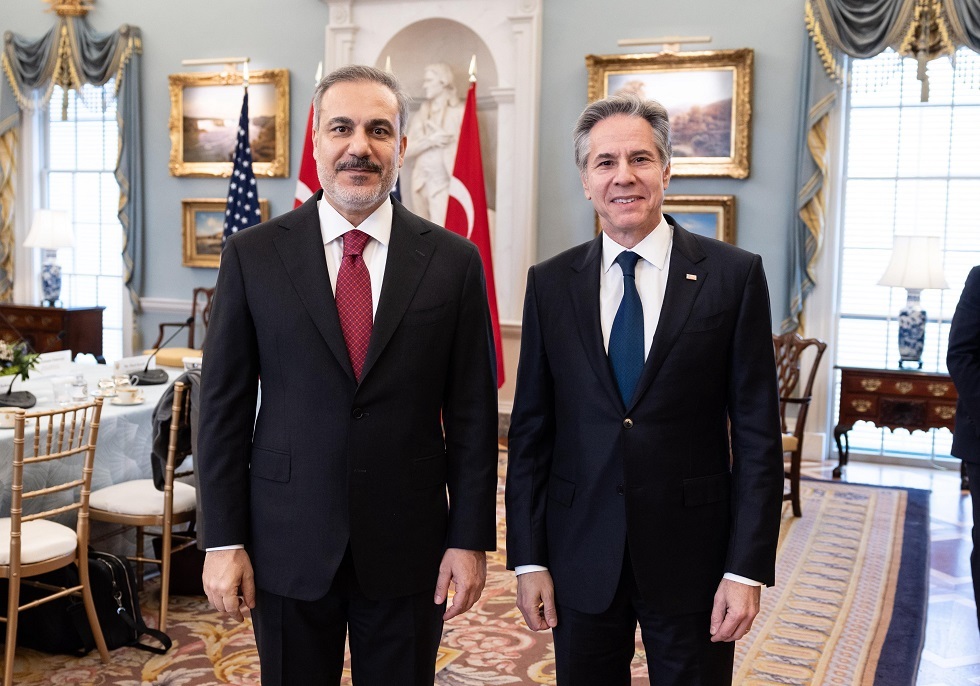The Turkish Foreign Minister, Hakan Fidan, made a visit to the US on March 7 and 8, which included holding the seventh meeting of the Turkish-American strategic mechanism, which was decided to be formed during the meeting of the Turkish President, Recep Tayyip Erdogan, and his US counterpart, Joe Biden, on the sidelines of the leaders’ summit. G20 in Rome in 2021.
During his visit, Fidan met with many US officials, including Secretary of State Anthony Blinken, US National Security Advisor Jake Sullivan, and a number of US lawmakers.
The Turkish Foreign Minister’s visit to the US was preceded by a visit to the head of the Turkish National Intelligence Agency, Ibrahim Kalin, and his meeting with the Director of the CIA, William Burns, and the visit of Senators Jeanne Shaheen and Chris Murphy to Turkey and their meeting with President Erdogan.
Multiple visits by US and Turkish officials within a brief timeframe underscores the concerted efforts of both nations to address contentious matters that have strained the relationship between these two pivotal allies, particularly as they rely on each other to advance their respective interests.
Several Issues Fanning the Flames
The meetings of the Turkish Foreign Minister during his visit to the US dealt with many bilateral and regional issues, in addition to discussing the security challenges of US policy in the Middle East, and its effect on Turkish national interests and security. The most prominent of these issues are the following:
1- Ceasefire in the Gaza Strip: Turkish Foreign Minister Hakan Fidan, during the G20 meeting in Brazil and the conclusion of the Antalya Diplomatic Forum, urged the international community to take a more proactive stance towards achieving an immediate ceasefire in Gaza, enhancing assistance to the inhabitants of the region, and resolving the conflict through the implementation of a two-state solution.
Turkey has vehemently condemned the Israeli assaults on Palestinian civilians in Gaza and has advocated for the prosecution of the perpetrators for genocide at the International Court of Justice. Turkey has compiled a comprehensive report detailing Israeli transgressions, which was transmitted to South Africa for presentation to the International Court of Justice, and disseminated to various governments and legislative bodies worldwide.
The Israeli military’s ongoing operations in the Gaza Strip were discussed during a meeting between the Turkish Foreign Minister, the US Secretary of State, and the US National Security Advisor. During the meeting, Fidan emphasized Turkey’s stance on the urgent need for a ceasefire in Gaza and the escalation of humanitarian assistance to the affected population. The joint Turkish-US statement issued at the seventh meeting of the Turkish-American strategic mechanism highlighted the mutual agreement between Turkey and the US regarding the critical nature of resolving the Gaza conflict and promptly addressing the humanitarian emergency. Furthermore, both parties reiterated their dedication to achieving a lasting resolution based on the two-state solution.
2- US support for Kurdish militias: The Turkish Foreign Minister raised concerns regarding US backing for the Kurds in Syria during discussions with American officials. The Syrian Democratic Forces, comprising the Kurdish People’s Protection Units and Arab combatants, have been a significant ally of the US-led coalition in combating ISIS for the past decade. Conversely, Turkey urges the United States to cease its assistance to the Kurdish militia, citing perceived implications on its national security. Ankara views the Kurdish People’s Protection Units as affiliated with the Kurdistan Workers’ Party, designated a terrorist group by Turkey.
Turkey asserts that the US continues to provide military assistance, logistical support, and engage in joint training and maneuvers with the Kurdish People’s Protection Units in northern Syria, despite Turkish objections, viewing this support as a threat to its national security. Consequently, Turkey is intensifying its military campaigns against the concentrations of Kurdish units and affirms its commitment to establishing a security buffer zone up to 40 kilometers deep inside Syrian territory along its southern borders. The Turkish Foreign Minister highlighted extensive discussions on US backing for the Kurdish People’s Protection Units with his US counterpart, the National Security Advisor, and congressional members during the Strategic Mechanism meetings for Turkish-American Relations in the US.
3- Joint efforts to combat terrorism: The US and Turkey have reinitiated Turkish-US counter-terrorism consultations within the strategic mechanism to enhance collaboration against terrorism, organized crime, and drug trafficking networks posing security threats to both nations. They have reaffirmed their mutual dedication to the enduring eradication of IS in Syria and Iraq, and have deliberated on joint efforts to combat the menaces of IS, Al-Qaeda, and their affiliated groups in Africa and Central Asia.
4- Returning detainees in Syria to their countries of origin: The Syrian camps hosting IS fighters from over 60 countries, predominantly children under twelve years old, constitute the most significant aggregation of captured terrorist combatants globally. This situation poses an ongoing hazard to both regional and international security, prompting discussions between the Turkish Foreign Minister and his US counterpart. Both parties concurred on the necessity of repatriating IS detainees and affiliates from northeastern Syria to their respective home nations for rehabilitation, reintegration into their communities, or prosecution.
5- Expanding the scope of defense cooperation: The Turkish Foreign Minister and the US Secretary of State engaged in discussions regarding enhancing defense relations between the two strategic allies within NATO following the approval of the F-16 aircraft deal by the US Congress. The talks also encompassed the lifting of restrictions imposed on the Turkish defense industry under the “Countering US Enemies” law subsequent to Turkey’s acquisition of the Russian S-400 missile defense platform. The emphasis was placed on the principle of refraining from penalizing allies and instead highlighting the significance of safeguarding NATO’s southern borders.
The joint statement by Turkish and US officials during the seventh strategic mechanism meeting highlighted discussions on enhancing security and defense relations to leverage the capabilities of the US and Turkey in addressing strategic challenges. The ministers disclosed plans for the upcoming defense trade dialogue and expressed intentions to strengthen defense industrial cooperation between the two nations.
6- Raising the level of economic relations: The Secretary of State of the US and the Foreign Minister of Turkey engaged in discussions regarding tangible measures to enhance economic relations, which have surpassed $30 billion over the past biennium, and reiterated efforts towards the objective of elevating trade volume to $100 billion. Emphasis was placed on the enduring Turkish-American collaboration in the energy sector, with Turkey presently standing as the primary importer of liquefied natural gas from the United States.
Furthermore, they both deliberated on the significance of broadening economic and trade cooperation, leveraging established bilateral platforms – exemplified by the recent digital dialogue on March 4 in Turkey – to advance this aim. Consideration was also given to mechanisms for capitalizing on financing prospects within the framework of the Partnership for Global Infrastructure. Both sides supported the Energy and Climate Dialogue, which will be launched and co-chaired by the US Department of Energy and the Turkish Ministry of Energy and Natural Resources, with the participation of the Turkish and US Foreign Ministries. The two ministers encouraged the Turkish and US public and private sectors to explore opportunities and develop concrete proposals for cooperation in this field.
The Power of Interests
Despite the recent advancements in US-Turkish relations following Turkey’s endorsement of Sweden’s NATO accession, the resolution of the F-16 aircraft matter, and a series of high-level visits by US and Turkish officials to address contentious issues between the two key allies, several unresolved issues persist. These include concerns regarding Turkish-Russian economic ties, alleged by the US to have facilitated Russia in evading US sanctions, Turkey’s procurement of S-400 systems, and the consequent imposition of sanctions by the United States. Other highly contentious issues include Turkey’s expulsion from the F-35 fighter jet initiative followed by its expressed apprehensions regarding US backing of Kurdish insurgents in Syria, branded as terrorists by Turkey. Additionally, tensions arose over the extradition of Fethullah Gulen, accused by Turkey of orchestrating the unsuccessful 2016 coup, a claim refuted by Washington due to insufficient evidence.
Despite these disputes, the strategic significance of Turkey as a key ally in the Middle East and NATO necessitates collaborative efforts between the two nations, leveraging mutual interests and fostering consensus. Notably, Turkish air bases, including the famous Incirlik Base, historically pivotal during the Cold War for housing U.S. nuclear armaments, have been instrumental in joint military operations such as anti-ISIS campaigns in Syria and logistical support for American troops in Afghanistan and Iraq.


